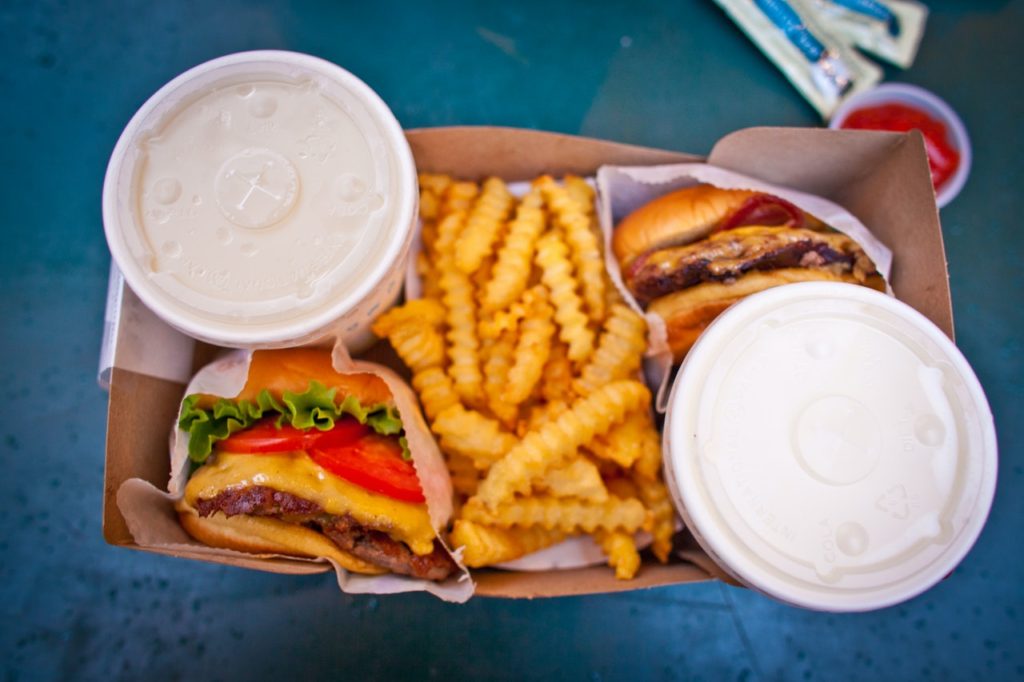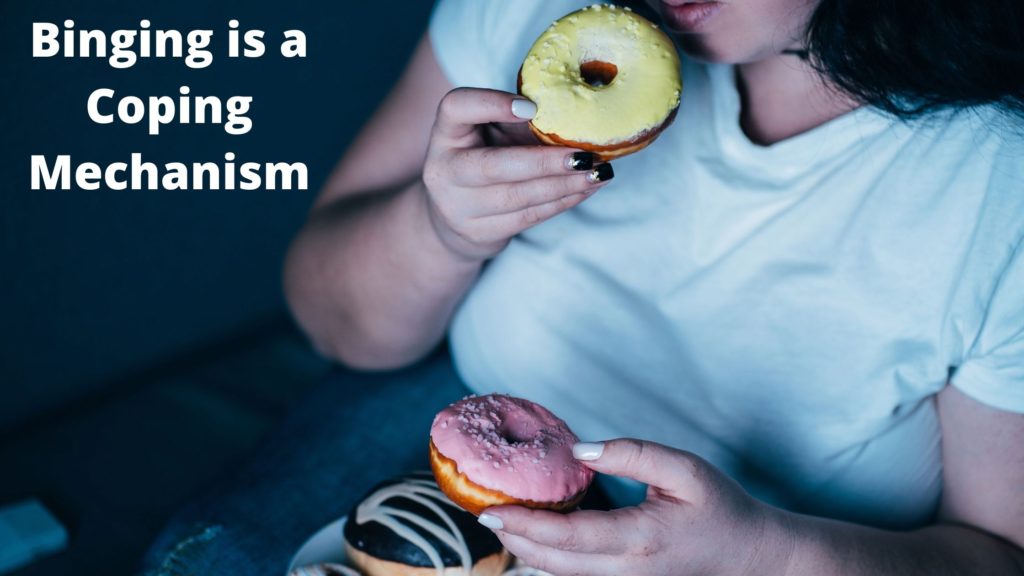
Food Addiction; What Food is as Addictive as Drugs?
You know that feeling when you’ve just eaten an entire bag of chips but you still crave more?
You feel bloated and sluggish, but you can not help it, and you reach for another slice of cake or a pint of ice cream.
Food addiction is real; certain foods can be as addictive as drugs.
Research indicates foods high in sugar and carbohydrates, such as chocolate and pizza, are just as addictive as certain drugs because they trigger the same brain regions as cocaine and heroin. In addition, obese individuals are more likely to develop a food addiction.
In this post, we will get deep into the nitty-gritty of food addiction, so if you want to know more, continue reading.

What causes food addiction?
Eating highly palatable foods triggers dopamine receptors (the pleasure center) in the brain, which triggers the reward system and makes you feel happy.
Highly palatable foods are high in salt, sugar, and carbohydrates and not typically found in nature.
The same brain regions affected by drugs are activated by sugar and carbohydrates, making food high in sugar and carbohydrates just as addictive as drugs.
And just like drugs, food addicts often experience withdrawal symptoms once they try to stop eating junk food and sugar.
A study published in The Journal PLOS ONE indicated that mice chose sugar over cocaine when given a choice.
The study concluded: “Our findings clearly demonstrate that intense sweetness can surpass cocaine reward, even in drug-sensitized and -addicted individuals. “

What is Food Addiction?
Food Addiction is an eating behavior involving consumption of highly palatable food in quantities beyond energy requirements.
In other words, food addiction is overeating sugar and carbohydrates regularly for pleasure, not survival.
The anticipation of the reward from food is an evolutionary pathway developed in early humans so they would have the motivation necessary to look and hunt for food.
But the problem is that the pathway evolved for natural foods found in nature, such as proteins and vegetables, not fast food.
How common is food addiction?
According to The Journal of Front Psychiatry, food addiction is found most frequently in patients with obesity, severe depression, higher impulsivity, posttraumatic stress disorder, and attention-deficit hyperactivity disorder in childhood.
Also, a systematic review revealed the prevalence of food addiction at almost 20% of the population in 2021.

What is the main cause of food addiction?
Food addiction is a coping mechanism many individuals develop due to childhood trauma or other events that caused them harm.
Eating junk food provides temporary relief or a distraction from anxiety and stress.
Dopamine is a neurotransmitter that gets released when you feel intense pleasure. Overstimulation of dopamine can result in addiction.
Eating food high in sugar and carbohydrate releases dopamine. Overeating results in overstimulation of dopamine.
Every time the dopamine drops, you crave more sugar to create the same pleasure you felt a few minutes ago.
The threshold of dopamine increases over time, and you will require more and more of the trigger (junk food) to feel the same pleasure you felt the first time you had that chocolate cake.

Are obese individuals more prone to food addiction?
Studies have indicated that obese individuals are more prone to food addiction because their D2 (dopamine receptor) availability is significantly reduced.
The study stated:” The availability of dopamine D2 receptor was decreased in obese individuals in proportion to their BMI. Dopamine modulates motivation and reward circuits; hence, dopamine deficiency in obese individuals may perpetuate pathological eating to compensate for decreased activation of these circuits.”
In simple terms: Obese individuals have fewer number of the brain’s dopamine D2 receptors, which causes them to feel less reward when they eat sugar and junk food which results in overeating.
What is the most common food addiction?
According to a study done by PLoS One in 2015, The Most Addictive Foods are:
- Chocolate
- Pizza
- Chips
- Cookie
- Ice Cream
- French Fries
- Cheeseburger
- Soda
- Cake
- Cheese
The Least Addictive Foods are:
- Water
- Cucumber
- Broccoli
- Beans ( No sauce)

How do I stop my addiction to food?
Overcoming food addiction is possible, and many have done so.
However, It’s essential to know willpower by itself is not a robust enough defense mechanism against food addiction. Simply trying to fight your cravings can make them worst.
You need a strategy!
Tips for overcoming food addiction
- Self-talk: Accept you are an addict. Decide you want to stop your addiction.
- Therapy: See a therapist to discover the underlying reason for your addiction.
- Low-carbohydrate diet: Try a low carbohydrate diet such as the Ketogenic or Mediterranean diet.
- Intermittent fasting: begin practicing intermittent fasting. Fasting helps stabilize your blood sugar and get rid of insulin resistance. In turn, helps you cure your cravings and food addiction over time.
- Join a group like Overeaters Anonymous for support.
- Meditate: Meditation is a powerful tool for gaining control of your thoughts and urges. Meditation helps calm the mind and ease anxiety and helps you be more mindful of your eating behavior.
- Anxiety and stress are two of the most critical factors in the development of food addiction.
If you want to learn more about how to overcome food addiction click here for more tips.
Takeaway:
Food addiction is a real thing, and it’s an epidemic. So if you find yourself addicted to junk food and sugar, don’t worry – you’re not alone. You can overcome your addiction by taking the proper steps. Follow the tips we gave you in this post, do your research, talk to your doctor and stay consistent; you will soon find yourself free of all food addiction.. Thank you for reading!
References:
Schulte, Erica M et al. “Which foods may be addictive? The roles of processing, fat content, and glycemic load.” PloS one vol. 10,2 e0117959. 18 Feb. 2015, doi:10.1371/journal.pone.0117959
Wiss DA, Avena N, Rada P. Sugar Addiction: From Evolution to Revolution. Front Psychiatry. 2018 Nov 7;9:545. doi: 10.3389/fpsyt.2018.00545. PMID: 30464748; PMCID: PMC6234835.
Wang GJ, Volkow ND, Logan J, Pappas NR, Wong CT, Zhu W, Netusil N, Fowler JS. Brain dopamine and obesity. Lancet. 2001 Feb 3;357(9253):354-7. doi: 10.1016/s0140-6736(00)03643-6. PMID: 11210998.
Wiss DA, Criscitelli K, Gold M, Avena N. Preclinical evidence for the addiction potential of highly palatable foods: Current developments related to maternal influence. Appetite. 2017 Aug 1;115:19-27. doi: 10.1016/j.appet.2016.12.019. Epub 2016 Dec 15. PMID: 27989563.
Lee PC, Dixon JB. Food for Thought: Reward Mechanisms and Hedonic Overeating in Obesity. Curr Obes Rep. 2017 Dec;6(4):353-361. doi: 10.1007/s13679-017-0280-9. PMID: 29052153.




